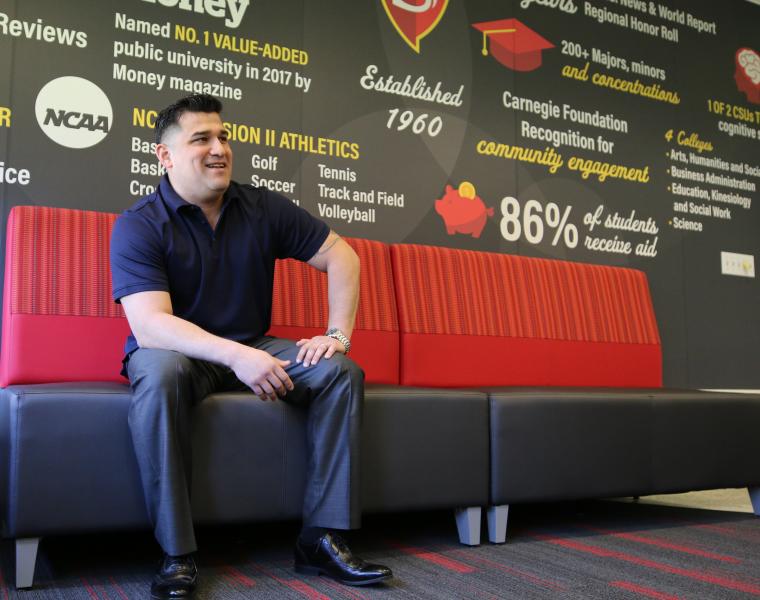
“When I became a sergeant in the Marines and started doing troop welfare — counseling the troops I oversaw — I found it very rewarding,” said Monroy, who is majoring in social sciences at the Stanislaus State Stockton Campus. He is on track to graduate in May and plans to pursue a master’s degree and a career as a licensed clinical social worker. “They’d come with all types of problems, and I’d give guidance based on my own experience being in their shoes as a young Marine. That’s when I realized counseling was something I could really do.”
It was a long-awaited epiphany for Monroy, who graduated from high school with no defined career goals. He enrolled in Delta College, took a part time job washing dishes and figured he’d find his calling soon. But inspiration didn’t come, and he started feeling restless after a few years slipped by.
“I guess I started getting a little tired of the scenery, so I took a break from school and joined the Marines,” he explained.
He was sent to boot camp in San Diego and tank operator training in Kentucky. Then he was stationed at Twentynine Palms, California, where he trained for combat deployment. Next stop: Helmand province, Afghanistan, to fight the Taliban for six months.
“I’d heard stories of combat, but didn’t know how to feel about it until I got there,” he said. “It didn’t feel real to me. We were receiving a lot of indirect fire at our station, and you just kind of get used to it, hearing bombs in the morning when you wake up.”
Through it all, he kept busy with numerous assignments, but never as a tank operator despite his training to be one.
“They needed my company to support other occupations, so they put us everywhere and we filled the gaps,” he said. “I was a guard on a watchtower, a mechanic fixing cameras and the lead gunner when we resupplied other stations and camps out in Afghanistan.”
When his first deployment was over, he went back to Twentynine Palms for six months before being redeployed to Afghanistan for another six months. His new assignment was to operate a vehicle equipped to detect landmine and improvised explosive devices (IEDs) with the goal of ensuring the safety of roads being used by other soldiers.
“Basically, you sit in a truck that you operate by yoursel f and scan the road for explosive devices,” he explained. “You can’t make a mistake, because that is your team in danger. You’re accountable for that, and it’s very stressful.”
When he first received the assignment, his initial thought was, “Really? Why did I get picked for this?” But ultimately, the work gave him a strong sense of pride.
“It went well, and everybody came back OK from my team,” he said. “I’m proud of that.”
When his first tour in the Marines ended, he signed up for a second one, and the scenery changes kept coming. He was assigned to a Naval ship and traveled all over the Pacific, then to Africa, China and South Korea. The stress of combat was behind him, but the stress of being separated from his family, especially his wife, wore on him. About two years into his second four-year term, he started thinking about his next step in life.
“I knew I didn’t want to do a third tour in the Marines,” he recalled. “I didn’t want to be separated from my family, and with my parents reaching retirement age, I wanted to be there for them like they’ve always been for me.”
That’s when his cousin, a counselor at Delta College, suggested he finish his associate’s degree and transfer to the Stan State Stockton Campus as a social sciences major.
“She spoke very highly of the Stan State program here in Stockton,” he said. “It sounded right for me, so I said, ‘yes, let’s do this.’”
After being honorably discharged from the Marines, he returned to Stockton with a solid plan to pursue his chosen career and give back to his community. He completed the classes he needed at Delta College and is using his G.I. Bill benefits to fund his Stan State education. With all his classes held at night, he supports his family by working days as a behavior technician tutoring children with autism.
For Monroy, the pieces of the puzzle have finally come together. Scenery changes don’t interest him at all.